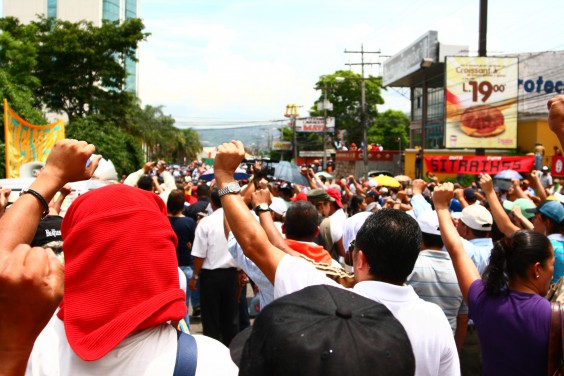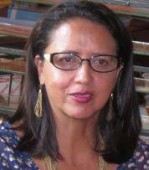Honduras: a New Supreme Court of Justice or Still the Old Political Wheeling and Dealing?
by Dina Meza translated by Katherine Wingfield-Dobbs / August 28, 2015 / No comments

Protesters during the 2009 Honduran Constitutional Crisis. Will Hondurans take civil liberties into their own hands? Photo via Wikimedia Commons.
Will the Honduran people seize their civil liberties for themselves before the January 2016 Supreme Court “elections”?
The election of the new Supreme Court of Honduras (Corte Suprema de Justicia or CSJ) is scheduled for January 25, 2016. Anyone who does not know that political wheeling and dealing is manufactured for the purpose of elections in this country would think that after the elections, the court will really be new. But that is a dream. Those who come to occupy the chairs of the judiciary are already members of the powerful groups who put them there in order to look after their affairs.

- Honduras has one of the world’s highest murder rates. It is also one of the most dangerous countries to practice journalism, ranking 129th out of 180 in the 2014 World Press Freedom Index. Journalists are regularly threatened, attacked, and killed for their work. The Honduran government fails to punish those who use violence against reporters, essentially granting them impunity. This space will be dedicated to examining the lack of protection for Honduran journalists exercising their profession. Topics will include the use of state-sponsored advertising as a mechanism to reward or punish publications, and censorship and self-censorship as hindrances to democratic progress.

- Born in Cofradía, Honduras, Dina Meza has been recognized by PEN International, Amnesty International, Index on Censorship and Reporters without Borders for her work as a journalist and human rights advocate. Currently, Dina is the driving force behind the creation of Honduras PEN Centre. In 2013, she wrote “Reign of Terror,” an in-depth report on threats to Honduran journalists for Index on Censorship’s magazine. In 2014, she was named one of Reporters Without Borders’ “100 Heroes and Heroines of Information.”
Since the 2001 Nominating Committee Law was created for the election of magistrates to the Supreme Court of Justice, it was believed that the process would lead to the politicization of the judiciary. It did not, and things remain the same as they were before its creation. As with the other “operators of justice,” members of the judiciary share the pie among those in positions of power, to the detriment of the Honduran people.
The Supreme Court of Justice is the highest court of the judiciary, made up of 15 magistrates, men and women, who are elected after receiving the favorable vote of two thirds of the members of the National Congress, which totals 128 parliamentarians.
Within the National Congress, the electoral process is the same: preliminary negotiations are carried out before the names – which have already been negotiated – are placed on the “elected” list. But it is already known that those who get through the backdoor negotiations in the dark of night carry a mandate to obey those who proposed them for office, where they will remain for seven years with the option of re-election.
In addition to the lobbying and negotiations from powerful groups to get their affiliates into the Supreme Court, civil society organizations push for change in the way magistrates are elected. They want magistrates to be required to fill in honest and independent suitability profiles, and demonstrate their merits and proven abilities in the exercise of jurisdictional duties.
The current Court raises many questions: independence does not exist and they have corroded what little remains of the ruins of the Honduran institution. They approved a regulation allowing for presidential re-election merely because the current president of the republic wanted to remain in power for a long time.
They have criminalized social protest with opening trials of human rights defenders, with the intention to create fear. Just as students from the National Autonomous University of Honduras call for greater democracy in university operations, they face pending lawsuits which do not meet the requirements to continue.
However, the criminalization of the student leadership by university authorities makes the various operators of justice act in unison to send them to jail if they continue with their protests. Militarized evictions have been carried out on the students, and 19 have been charged with “illegally retaining public spaces.” Authoritarianism surrounds the university campuses in Honduras and removes any opportunity for dialogue with the power-hungry authorities.
The election of this new period of the Supreme Court poses a difficult situation for those who repealed the power of the nation. The people of Honduras are no longer the same as they were 30 years ago: today they are the plaintiffs, they will no longer be deceived, and their belief in the stories they were fed has ended.
While it is true that the people are less likely to believe their lies, those who consider Honduras their personal business have increased their security system – the police – which protects their illegal actions, which are no longer concealed.
The use of force as a weapon will not be scrapped. For the current government, which has concentrated the power of the nation in one man alone, who commands everyone, there are two options that I see. They can install magistrates that will play the re-election game and protect the president in order to achieve his goal. If the president cannot complete the list of magistrates in his favor, the second option is to re-elect the current court and remove those who may not be to his liking so that he may remain in power.
Alongside a hope that the bad omens will not come true, is the hope that the Honduran people who have walked many miles with the torches of hope held in their hands will take the reins completely and rescue popular sovereignty, dismantle corruption and impunity, and ending a cycle of shame. How I hope that that day comes soon!




